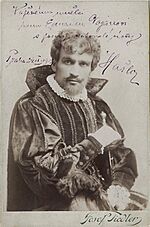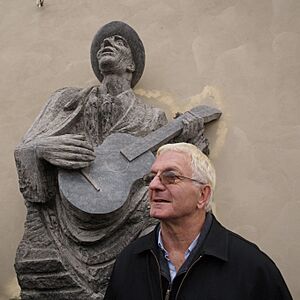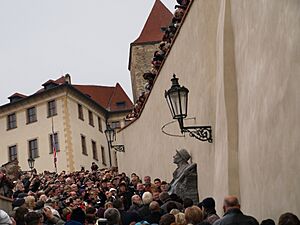Karel Hašler facts for kids
Quick facts for kids
Karel Hašler
|
|
|---|---|

Karel Hašler in one of his roles at the National Theatre, Prague, around 1904.
|
|
| Born | 31 October 1879 |
| Died | 22 December 1941 (aged 62) Mauthausen, Nazi Germany
|
| Occupation | Actor songwriter Film director writer dramatist screenwriter |
Karel Hašler (born October 31, 1879, in Prague – died December 22, 1941, in Mauthausen) was a famous Czech artist. He was a talented songwriter, actor, lyricist, film and theatre director, composer, writer, and screenwriter. Sadly, he was murdered in the Mauthausen concentration camp during World War II.
Contents
Karel Hašler's Life Story
Karel Hašler first trained to be a glove-maker. But he loved the theatre from a young age. He often performed with amateur theatre groups. In 1897, after his first show at the Aréna Theatre, he left home. He then joined different travelling theatre companies, performing in many places.
In 1902, he joined a theatre in Ljubljana, Slovenia. Soon after, he returned to Prague. There, he became a member of the famous National Theatre. He was very good at acting in plays with lots of talking. He also used his singing skills. Around 1908, he began writing his own music. At the same time, he started working in cabarets. These were places where people watched musical and comedy shows.
He became a director and leader of several Prague cabarets. These included Lucerna (from 1910–1915 and 1918–1923) and Rokoko (from 1915–1918). In 1908, he married the sister of a well-known pianist and composer, Rudolf Friml.
Hašler's Film Career
During World War I, Karel Hašler also started working in silent films. He acted, directed, and wrote scripts. In 1914, he made a comedy called České hrady a zámky (Czech Castles). This film was based on his own script. He also appeared in other silent films, like Ahasver.
|
"If our songs perish, We'd lose all we cherish; Living would then be in vain." |
| Ta naše písnička česká, end of the third stanza, English translation published in Chicago, 1934. |
When sound films became popular in the 1930s, Hašler could use his amazing singing voice. In his first sound film, Písničkář (Balladeer, 1932), he sang patriotic songs. These included Svoboda (Freedom) and Ta naše písnička česká (Our Czech song). He acted in more than 13 films between 1932 and 1941. In his last film, Za tichých nocí (In the Quiet Nights, 1942), he played himself. This film was made by his son, Gina Hašler.
Arrest and Tragic Death
In September 1941, while working on a film, Karel Hašler was arrested by the Gestapo. This was the secret police of Nazi Germany. He was sent to the Mauthausen concentration camp. The main reason for his arrest was his patriotic songs. These songs helped strengthen Czech national pride during a time of danger. On December 22, 1941, he died in the camp due to the terrible conditions and mistreatment.
After World War II, during the time of Communist Czechoslovakia, Karel Hašler was not officially recognized. This was because many of his songs praised Tomáš Masaryk, the first president of Czechoslovakia, and the Czechoslovak Legionnaires. His songs also made fun of communists.
Remembering Karel Hašler
A popular Czech herbal-menthol hard candy is named Hašlerka after him. These candies have been around since the early 1900s. Today, the company Nestle owns the trademark.
The term "Hašlerky" also refers to a type of song. These are songs written by Hašler or ones that have a similar style.
A Czech astronomer, Lenka Kotková, named an asteroid 37939 Hašler after him.
In 2008, Czech directors Marek Jícha and Josef Lustig made a documentary. It was called Písničkář, který nezemřel (The Immortal Balladeer of Prague). This film tells the story of Hašler's son, Thomas Hasler.
On October 31, 2009, a monument to Karel Hašler was unveiled in Prague. This was to celebrate his 130th birthday. The sculpture, created by Stanislav Hanzík, is located at the Old Castle Steps.
In 2013, the band Patrola Šlapeto recorded a CD and DVD. It featured 23 of Hašler's songs. These were based on original recordings found in music archives. It was the first time in 80 years that his original tunes had been recorded.
Karel Hašler created more than 300 songs. Many of them became popular "folk songs" that people still sing today. His patriotic songs helped strengthen the national spirit of the Czech people. Especially during times when they faced danger and oppression. After his death, his songs became a symbol of national resistance and hope.
Karel Hašler's Creative Works
Karel Hašler was a very busy artist. He wrote, acted, directed, and composed music for many projects.
Selected Songs
Here are some of his most famous songs:
- Hoši od Zborova
- Kampak na nás, bolševíci? (1919)
- Po starých zámeckých schodech
- Pětatřicátníci
- Ta naše písnička česká
- Čí je Praha? Naše!
- Já mám holku od Odkolků
- Strahováček
- Podskalák
Film Roles
Karel Hašler acted in many films. Some of his notable roles include:
- Pantáta Bezoušek (The Old Man Bezousek, 1941)
- In the Still of the Night (1941) – where he played himself
- Ať žije nebožtík (Long Live with Dearly Departed, 1935)
- Varhaník u sv. Víta (Organist at St. Vitus Cathedral, 1929)
- Batalion (Battalion, 1927)
- České hrady a zámky (Czech Castles and Palaces, 1914)
Writer and Composer
Hašler also wrote stories and screenplays for films. He composed music for many films and plays. Some of his writing and composing credits include:
- Babička (Grandmother, 1940) – writer
- Jánošík (1935) – writer and producer
- Srdce za písničku (A Heart for a Song, 1933) – writer, composer, and director
- Písničkář (Balladeer, 1932) – writer and composer
Director
He directed several films, including:
- Irčin románek (Irca's Romance, 1936)
- České hrady a zámky (Czech Castles and Palaces, 1914)
 | Laphonza Butler |
 | Daisy Bates |
 | Elizabeth Piper Ensley |



